Helping First-Generation Students Unlock Their Potential
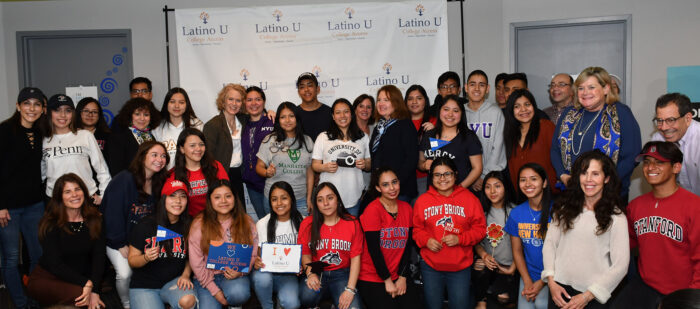
“We’re trying to make the starting lines more equal; if it’s a race, not everyone is running with the same pair of sneakers.”
Shirley Acevedo Buontempo understands challenges faced by low-income students seeking higher education, but Latino U College Access (“LUCA”), her Westchester nonprofit, is committed to increasing enrollment and completion for Latino youth who are first in their family to attend college. Through educational programs, advocacy and collaboration with partner school districts, businesses and volunteers, LUCA opens doors previously unimaginable.
“Our first-generation scholars are more than just children: they’re translators, have an incredible amount of family obligation, and have maturity beyond their years,” said Buontempo, LUCA’s founder and CEO. But they lack knowledge about their options.
“When our first-gen scholars cry, they’re crying for what their parents and grandparents have sacrificed. We’re moved by them – their awesome sense of responsibility and recognition of how this next step can change their lives.”
A Glaring Need, And a Vision
Buontempo, Puerto Rico-born but Bronx-bred, was first in her own family to attend college: “as a first-gen married to a first-gen Italian-American, education opened doors to opportunity we never dreamed of.”
After working in marketing and advertising, Buontempo pursued a Masters in Public Administration at Pace University examining higher education challenges and success among Latinos, inspired to address both financial considerations and cultural ones like reluctance to stray far from home.
Buontempo obtained nonprofit designation in 2012, launching a pilot program – an English/Spanish information session on college options–at Fox Lane High School, but recognized a need for individualized attention.
With an educational consultant, she sought to identify “what resources do more affluent families have access to and how can we make that available to low-income, underrepresented students?” The model for LUCA “college coaching” was born.
Eligibility & Introducing the Basics
LUCA promptly expanded to three majority-Hispanic Westchester high schools: Ossining, White Plains and Sleepy Hollow. Juniors nominated by guidance counselors at partner schools must demonstrate academic potential (3.5 GPA with honors/AP courses), be first in their family to attend a U.S. college, and qualify for free or reduced lunch. This year, more than 100 students were nominated, 60 applied, and 40 chosen as LUCA’s Class of 2020, growing each year from only two in 2012.
LUCA scholars attend a weeklong July “College Knowledge” Orientation at Pace University, which provides classroom and computer lab space. Workshops expose them to online search tools, campus resources, financial aid, college lists, and the Common Application. Scholars also network with first-generation professionals from corporate partners like MasterCard and Morgan Stanley, and have access to free summer SAT preparation classes and essay brainstorming seminars.
College Coaching: The Key to Scholar Success
LUCA’s small staff works virtually around the clock, but volunteers enable its outreach, with almost 100 community members trained to support administratively, at information sessions and supply drives, or with financial aid applications.
Noting vital collaboration between LUCA’s partner school districts, volunteers, libraries and corporate sponsors, Buontempo stressed “the power of partnership–engaging the entire community for the benefit of the children. Their success is our success.”
College coaches from Chappaqua, Armonk, Briarcliff and elsewhere develop close relationships with students, providing individualized attention to detail, personality and passion Buontempo envisioned. Supported by Deputy Director Diane Rosenthal and College Access Program Manager Emily Latainer, coaches get to know scholars over the summer, exposing them to colleges they’ve never heard of or thought were beyond their reach academically or financially. College lists are created, visits encouraged, and personal statements started. Coaches also organize the many pieces of the process, from Common Application accounts to standardized testing, interviews and college “fly-in” programs for students from low-income, diverse backgrounds.
College coach Ellen Lynch loves having real impact on a young life: her 2019 scholar studies biochemistry at SUNY Stony Brook after a prestigious summer internship. “I can’t begin to imagine the sense of helplessness many of these parents feel, especially where there’s a language barrier. The fact that we can help ease that helplessness is an incredible thing,” she said.
Thirty-one coaches delivered over 2,400 hours of support to the 36-student Class of 2019, now freshmen at colleges ranging from Ivies to SUNY institutions and everything in between. LUCA scholar/Ossining High School graduate Ariana Cardenas, an aspiring forensic psychologist, is both grateful and cognizant of the responsibility to set an example for other first-gen students: “LUCA has created an amazing family and support system that I’ve created a bond with, especially my College Coach, which has helped my journey and determination to pursue the highest level of education I can.”
Latainer adds that the “unwavering determination of our scholars and their families, and their desire to change the trajectory of their lives” inspires the entire team to work harder to create meaningful change for a deserving community.
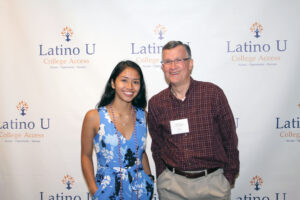
Financial Concerns
College acceptance aside, tuition is an overwhelming concern for LUCA families. Trained volunteers assist with the formidable task of completing the complex Free Application for Federal Student Aid (“FAFSA”) and related forms to increase aid and identify scholarship opportunities. In 2019, LUCA scholars received $5.3 million in financial aid, the average annual out-of-pocket cost of college just over $7,000.
“Students can’t succeed until parents have buy-in; our goal is to get that buy-in, but fears set in, largely financial. Their child is entering a world they know nothing about,” said Buontempo.
LUCA also offers free programming to the wider Latino community. More than 4,000 parents (many with incomes under $35,000) and students have attended LUCA FAFSA Boot Camps and Spanish-language Community Information Sessions discussing college options, applications and financial aid.
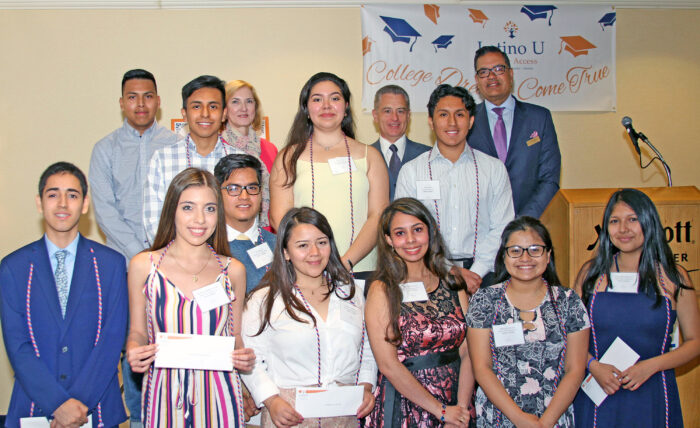
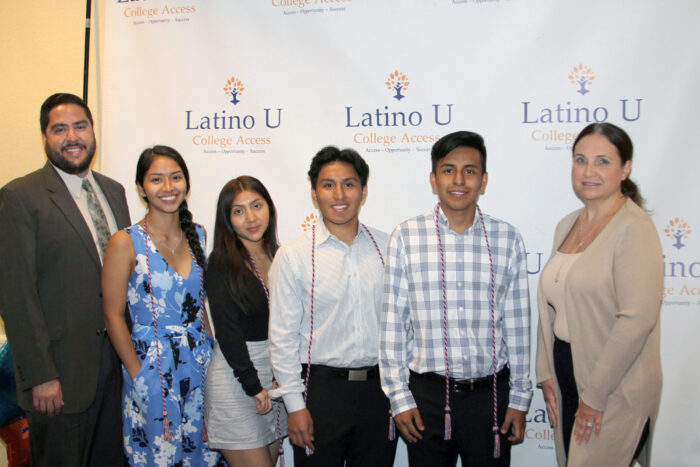
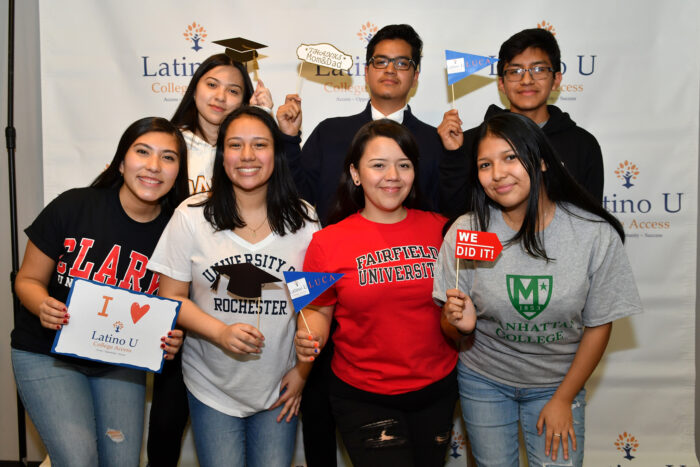
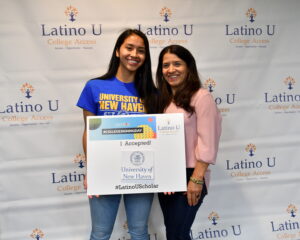
First Gen Forward: Continuing Support
LUCA’s coaching program culminates in a Graduation Celebration attended by scholars, parents, staff, Board members, volunteers and dignitaries, this June including Guillermo Linares, President of the NYS Higher Education Services Corporation (himself first generation) and Westchester County Executive George Latimer. The palpable sense of pride was underscored by personal stories relayed by attendees.
But LUCA’s job isn’t over: it continues to support scholars until they graduate from college with full time jobs. LUCA’s “First Gen Forward” College Success program launched in 2016 with a $100,000 Impact 100 Westchester grant, since “65% of first-generation college students drop out because of a lack of social capital and knowledge,” Buontempo said.
A seminar before freshman year addresses stress management, homesickness, grading, and “imposter syndrome,” the cultural adjustment of a first-gen on campus.
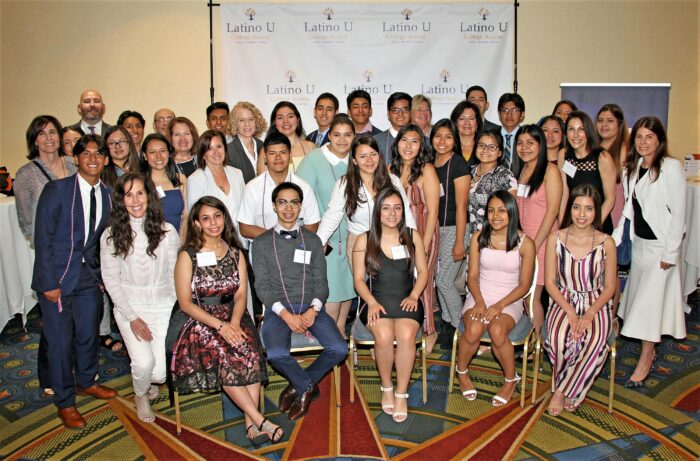
“We check on them throughout the year, make sure they’re still on track,” she added, and will intervene if there are issues that parents aren’t equipped to handle.
LUCA also assists with resume preparation, LinkedIn, and job searches, working with local businesses to identify paid internships: “corporate partners are always looking to expand diversity, and we have incredible talent among our scholars,” Buontempo added. Scholars also graduate with an overwhelming desire to “pay it forward and uplift their community.”
“’Lift while you climb’ really resonates,” she said.
Increasing Impact on an Underserved Population
To date, LUCA has “graduated” 136 scholars, 98% of whom are on track to complete college, defying national odds showing that 41% of Latino students attend 2-year community college, and more than half do not complete college. Conversely, 93% of LUCA scholars attend 4-year universities (60% private institutions), with 54% at “most selective to very selective” schools.
“We’re trying to flip it on its head,” Buontempo said.
LUCA has received local and national recognition, named 2019 Examples of Excelencia Finalist, and Buontempo presented with the Pace Opportunitas in Action Award and Univision Nueva York Angel del 41. She hopes to expand both scope and reach: four additional county schools have Latino populations exceeding 50%. LUCA is limited by capacity–management, training, and workshops–but buzz is building and “we’re primed to jump. Our program model has established success and is achieving results beyond expectation.”
The Board of Directors, a diverse group of mission-driven community members and professionals, has shifted its focus from “managerial” to fundraising. Chappaqua’s Jane Matluck, a Board member and coach since 2013, is committed to introducing LUCA to more colleges, as diversity officers are generally receptive to community-based organizations. “What’s special about our program is that volunteers are trained in-house and get ongoing support, developing relationships with students and other coaches,” Matluck said. Lynch agreed, noting LUCA’s exceptional job differentiating skill sets–from financial aid expertise to coach support– keeping volunteers engaged. Focused on growing capacity to help more students, LUCA also aspires to start working with scholars earlier to give them even more of a head start. LUCA credits its success, though, to the drive of its incredible scholars.
“Honoring their parents, and their parents’ sacrifices, they recognize that the future of their family weighs on their shoulders,” Buontempo emphasized. And with LUCA’s help, their journeys can begin.
To donate, support LUCA’s Dorm Supply drive, or learn about corporate partnerships or volunteer opportunities, visit latinou.org.
